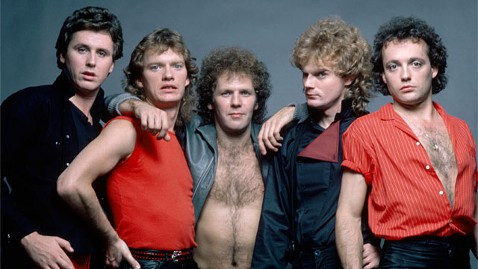For decades, the rhythm of the work week has been a constant in adult life, often structured around the school calendar. From early mornings to late afternoons, Monday to Friday, the cycle repeats itself, season after season. This was the reality for many, a shared grind eagerly anticipating the arrival of Friday evening and the precious weekend. But what happens when you step outside this routine? What’s the story behind the song that perfectly encapsulates this universal feeling of weekend anticipation? Let’s dive into the story of Loverboy’s iconic track, “Working for the Weekend,” and explore why this 80s hit remains an enduring anthem for those yearning for freedom from the daily grind.
The Weekday Reality vs. Weekend Dream: Finding Inspiration
Retirement can be a revelation. Leaving behind the daily work routine opens your eyes to a different pace of life. Suddenly, the world you thought was universally rushing towards the weekend reveals a more nuanced reality. Morning strolls through town, once imagined as bustling, become peaceful encounters with shopkeepers restocking shelves, seniors enjoying a leisurely pace, and new parents with strollers. Even the beach, usually packed on weekends, is serene and almost empty during the weekdays. This stark contrast between the work-driven weekdays and the relaxed atmosphere of “off-hours” was the very observation that sparked the idea for “Working for the Weekend.”
This newfound perspective is precisely what Loverboy guitarist Paul Dean experienced. Having achieved success with Loverboy’s debut album, the band found themselves in a unique position. Their early triumphs, including hits like “The Kid is Hot Tonite” and “Turn Me Loose,” from their self-titled debut album, granted them a level of financial freedom uncommon for many. This success allowed them to tour extensively, sharing stages with rock legends and experiencing a life detached from the typical 9-to-5. During breaks between tours, Dean found himself with time to explore and observe the world around him without the constraints of a regular workday.
 Loverboy band members in the 1980s: Mike Reno, Scott Smith, Paul Dean, Doug Johnson, and Matt Frenette, the lineup behind the 'Working for the Weekend' song.
Loverboy band members in the 1980s: Mike Reno, Scott Smith, Paul Dean, Doug Johnson, and Matt Frenette, the lineup behind the 'Working for the Weekend' song.
From “Waiting” to “Working”: Crafting the Weekend Anthem
It was on one of these relaxed days, a visit to a quiet beach in the middle of the week, that inspiration struck Dean. The emptiness of the beach during daylight hours highlighted the fact that most people were at work. This observation resonated with the universal experience of anticipating the weekend. As a songwriter constantly seeking lyrical ideas, Dean started to formulate a song around this feeling. Initially, the song title was conceived as “Waiting for the Weekend.”
Dean presented his idea and initial lyrics to lead singer Mike Reno. Reno recognized the potential but suggested a more active and relatable title: “Working for the Weekend.” This shift in perspective was crucial. It wasn’t just about passively waiting for the weekend; it was about the active effort and anticipation that went into working towards that freedom. Dean readily agreed that “Working for the Weekend” captured the essence of the sentiment more powerfully.
Together with the full band – Reno, Dean, drummer Matt Frenette, keyboardist Doug Johnson, and bassist Scott Smith – they structured the song to reflect this duality. The verses were designed to evoke the feeling of being constrained and pent-up during the work week, musically mirroring the anticipation and restrained energy of waiting for the weekend to arrive. In contrast, the chorus was crafted as an explosive release, a sonic representation of the exhilaration and freedom that the weekend brings. This dynamic structure mirrored the collective release of energy felt at the end of a long work week, much like the iconic movie scenes of students bursting out of school doors at the start of summer vacation.
“Working for the Weekend”‘s Explosive Impact and Enduring Legacy
Released on the Get Lucky album in 1981, “Working for the Weekend” became an instant sensation. The song catapulted Loverboy to new heights, solidifying their place in the music scene. Get Lucky achieved massive commercial success, selling over four million copies and earning Loverboy a record-breaking six Juno Awards in a single year. “Working for the Weekend” soared to the top of the charts in Canada and became a top ten hit across numerous international markets, including the United States, becoming synonymous with the Friday feeling and the anticipation of weekend freedom.
 Loverboy's 'Get Lucky' album cover, featuring the hit single 'Working for the Weekend', a classic 80s rock anthem.
Loverboy's 'Get Lucky' album cover, featuring the hit single 'Working for the Weekend', a classic 80s rock anthem.
Throughout the 1980s, Loverboy maintained a relentless touring schedule, both as headliners and supporting major acts. Their string of hits continued, including tracks like “When It’s Over,” “Hot Girls in Love,” and “Lovin’ Every Minute of It,” cementing their status as 80s rock icons. Even after a hiatus in the late 80s, the band reunited in 1991, reigniting their passion for performing and continuing to tour globally to this day.
While Loverboy has released new music in the 21st century, their enduring appeal rests heavily on their classic 80s catalog. “Working for the Weekend” remains a cornerstone of their live shows and consistently generates the most enthusiastic audience response. As Paul Dean himself acknowledges, Loverboy’s discography is filled with recognizable and beloved songs, and “Working for the Weekend” stands out as a timeless anthem that continues to resonate with audiences worldwide. This enduring popularity has earned Loverboy a place in the Canadian Music Hall of Fame, a testament to their lasting impact on music history.
Still Working for the Weekend? The Anthem Endures
Over forty years later, the sentiment behind “Working for the Weekend” remains incredibly relevant. The desire to control personal time, to escape the constraints of the work week, is a universal longing. For those who have retired, every day can feel like a weekend, a blessing of freedom. For those still navigating the working world, the weekend represents a precious taste of liberation. “Working for the Weekend” perfectly captures this feeling, serving as an anthem for those counting down the hours until Friday arrives. Whether you’re retired and enjoying every day or still working towards that weekend freedom, the song’s energy and message continue to resonate. It’s a celebration of personal time and the joy of breaking free from the routine, even if just for 48 glorious hours.
For more on Loverboy, visit their official website.
Relive the energy – watch the music video for “Working for the Weekend” here or check out the lyric version.
Discover Loverboy’s star on Canada’s Walk of Fame here.

